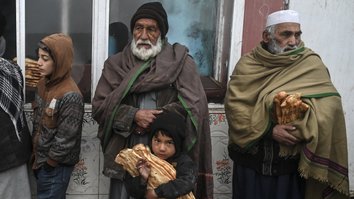KABUL -- At least three leading international aid agencies have partially resumed life-saving work in Afghanistan, after assurances from local authorities that Afghan women can continue to work in the health sector.
Hundreds of NGOs have been instrumental in trying to address one of the world's worst humanitarian crises, with half of Afghanistan's 38 million people hungry and three million children at risk of malnutrition.
With the arrival of the cold winter months, aid is even more crucial, especially for the thousands of internally displaced people (IDPs).
CARE, Save the Children and International Rescue Committee (IRC) suspended their operations in late December in protest at a government order banning Afghan women from aid work, the latest rollback of women's rights in the country.
![Women wait in a queue during a World Food Programme (WFP) cash distribution event in Kabul on November 29, 2021. [Hector Retamal/AFP]](/cnmi_pf/images/2023/01/18/40332-000_9tl3ky-585_329.jpg)
Women wait in a queue during a World Food Programme (WFP) cash distribution event in Kabul on November 29, 2021. [Hector Retamal/AFP]
"We have received clear, reliable assurances from relevant authorities that our female staff will be safe and can work without obstruction," Save the Children said in a statement, confirming they have resumed work in the health sector in the past few days.
"However, with the overarching ban still in place, our other activities where we do not have reliable assurances that our female colleagues can work, remain on hold."
The IRC and CARE also confirmed they have resumed work with women staff in the health sector.
The international community has been urging the government in a series of high-level meetings to reverse the order banning women in the aid sector, which was expected to have heavy consequences on aid flows coming into the country.
Abdul Rahman Habib, spokesman for the ministry of economy that ordered the ban, told AFP that it was "a need for our society" that women were allowed to work in the health sector.
"We need them to support the malnourished children and other women who need health services. They (women staff) are working in line with our religious and cultural values."
'New guidelines'
Two aid officials said negotiations were ongoing with the authorities to allow women to work in other sectors, including education, water, sanitation and food distribution.
"We are hopeful that there will be new guidelines soon," said an aid official with a foreign NGO, who asked not to be named.
The authorities might "selectively open" other sectors for women, another aid worker said, also speaking on condition of anonymity.
"They are expected to ask NGOs which specific departments within their organisations and work sectors they need women staff for, and accordingly, permissions could be given," he said.
Aid officials said organisations had already segregated men and women employees and that women were wearing hijabs.
Women workers are vital for on-the-ground aid operations in Afghanistan, particularly in identifying other women in need.
"From the start of winter our situation has been worse. We have not eaten anything for four days," said Parveen, a mother of eight, standing in a queue to receive food aid in Kabul.
She said she preferred receiving aid from women workers rather than men.
"To a woman, you can tell everything," Parveen, 38, said.
The ban was one of two crushing orders made in rapid succession last month, after authorities had first barred women from university education.
Women have also been barred from going to parks, gyms and public baths. They are blocked from travelling without a close male relative and must cover up in public.

![Afghan people stand with food aid being distributed by an NGO at a gymnasium in Kabul on January 17. At least three leading international aid agencies have partially resumed life-saving work in Afghanistan, after assurances from the authorities that Afghan women can continue to work in the health sector. [Wakil Kohsar/AFP]](/cnmi_pf/images/2023/01/18/40331-af-aid-585_329.jpg)






